
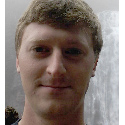
Sr. ROV Pilot/Technician
Oceaneering
James Aldridge, born and raised in Austin, Texas, attended the University of Texas studying Electrical Engineering for two years before being introduced to the world of remotely operated vehicles (ROVs). Dropping the textbooks for a joystick and a multimeter, James has been fortunate enough to spend five years working around the world with all different kinds of ROVs.

Photographer
Ocean Geographic Magazine
Michael Aw is an author, explorer, photographer, and conservationist. His accolades include winning more than 65 international awards, including the Wyland ICON Award, and being named as one of the world's most influential nature photographers by Outdoor Photography. His essays and pictures have been featured in BBC Wildlife, National Geographic, the Smithsonian, Nature, Ocean Geographic, Times, and Nature Focus, to name just a few. Michael has authored 56 books and is the founder of Asian Geographic and Ocean Geographic. The Shark Research Institute recognized Michael with the Peter Benchley Shark Conservation Award in 2008 for his campaign against shark fin soup consumption in the Asia Pacific region. In 2015, Michael was the project director for the Elysium Artists for the Arctic expedition with 65 team members, comprising the world's best image makers and scientists, to document the flora and fauna for a movie and climate change index of the Arctic from Svalbard, Greenland, to Iceland. While on the U.S. Coast Guard Cutter Healy, Michael will be shooting still photography and directing a documentary about the expedition.
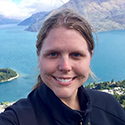
Web Coordinator
Global Foundation for Ocean Exploration
Caitlin Bailey holds a MFA in Science and Natural History Filmmaking from Montana State University and a B.S. in Animal Biology from Texas A&M University-Corpus Christi. Her background includes fieldwork with sea otters in Alaska, lab research on wild mice vocalizations, research on migratory bird distribution on the Texas coast, and mentoring undergraduate students in biology. She also volunteered with the Texas Marine Mammal Stranding Network and the Second Chances Wildlife Rehabilitation program at the Texas State Aquarium. In pursuit of her filmmaking career, Caitlin held a writing and film internship at NASA Goddard Space Flight Center and worked as a camera operator and stage manager with Montana PBS. Before her current position with The Global Foundation for Ocean Exploration, she discovered the amazing world of ocean exploration as a video engineering intern onboard the E/V Nautilus. She has since been to the Mariana Trench onboard NOAA Ship Okeanos Explorer and is very excited to be producing both photos and videos of this Arctic expedition to share with the public.
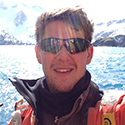
Marine Advanced Technology Education (MATE) Intern
University of Texas, University of Missouri
Nicholas Benz will be serving as a MATE intern under Ship-based Science Technical Support in the Arctic (STARC) personnel during the cruise. He received his B.S. in geophysics from the University of Texas at Austin in 2015. When not studying in the computer labs, he was thinking about rock climbing or the next field trip. Fortunately, a number of these field trips consisted of research cruises for geophysical research. After taking part in a seismic survey on the R/V Palmer and retrieval of seafloor seismometers on the R/V Thompson, his desire to continue work at sea was set. His duties as an intern will be facilitating science aboard the Healy, determined as STARC sees fit. After the cruise, Nicholas will begin studies at the University of Missouri to study subduction zones through GPS and hopes to integrate a marine-based solution to land-restricted GPS antennas.

Media
Microcosm/Montrose Pictures
Mathew Broughton graduated from Brooks Institute of Photography in Santa Barbara, California. He then spent three years working as a full-time underwater cinematographer and head editor for Dive Into Your Imagination Productions. Mathew then started his own freelance video production and media services company (MatieB Productions). He is highly skilled as a professional videographer, photographer, and editor and works with clients both locally and around the globe. Working and collaborating with other professionals, he strives to bring the highest level of professionalism through his media services and film-based productions. Onboard the Healy, Mathew is a member of the Microcosm production team through Montrose Pictures.
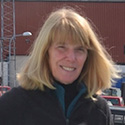
Professor
University of Connecticut
Ann Bucklin studies the molecular ecology and evolution of marine zooplankton, with a special focus on crustaceans. Ann's field of research has been transformed by rapid advances in molecular technologies, and her studies now include comparative genomics and transcriptomics of non-model marine species, as well as molecular analysis of pelagic biodiversity through DNA barcoding and metabarcoding. Her most recently submitted paper describes the exceptional nature of the genome of the Southern Ocean salp. She has participated in oceanographic field campaigns in many ocean basins, and has a special appreciation for the beauty and remaining mysteries of Arctic and Antarctic regions. Ann is currently Professor of Marine Sciences at the University of Connecticut. She earned a PhD in Zoology from the University of California at Berkeley, with postdoctoral studies at Woods Hole Oceanographic Institution and the Marine Biological Association of the UK. She was a Fulbright Senior Scholar in Norway (1992-1993) and was elected Fellow of the American Association for the Advancement for Science (1995). She currently serves on the Science Advisory Board of the Mystic Aquarium (Mystic, CT); the Board of Trustees of the Sir Alister Hardy Foundation for Ocean Science (SAHFOS, Plymouth, UK); and as chair of the International Council for the Exploration of the Sea (ICES) Working Group on Integrative Morphological and Molecular Taxonomy (WGIMT).

ROV Supervisor
Oceaneering
Joe Caba has been flying and managing remotely operated vehicles (ROVs) for 25 years, successfully completing demanding projects for the scientific community, the oil and gas industry, and private individuals with interests ranging from historic shipwrecks to "mythological" monsters. Onboard the Healy, Joe will be part of the ROV crew supporting the scientists and explorers. He's retrieved rare sea creatures from the depths of the Arctic Ocean for NOAA. He and his crew found historic vessels, including John Cobb's Crusader in Loch Ness and the long-lost World War II Grunion submarine in the Aleutian Islands. He has also worked on expeditions sponsored by the Woods Hole Oceanographic Institution and National Geographic. Joe earned his Bachelor of Science degree in Aeronautical Engineering from Cal Poly SLO. As an engineer at Lockheed Missiles and Space for eight years, he participated in sub-sea navigation systems as well as other projects. When not flying ROVs, he enjoys flying airplanes and sculling.

Media
Microcosm/Montrose Pictures
Michael Caplan is an independent film director, producer, and educator. He is currently in production with Michele Hoffman Trotter on Microcosm, a documentary that showcases the ocean in a way it has never been seen: from the previously unexplored perspective of the Microuniverse. In 2014, he released Algren, a documentary that explores the life and legacy of Nelson Algren, the National Book Award-winning author of Man With the Golden Arm and Walk on the Wild Side. The film premiered at the Chicago International Film Festival. Caplan also directed and wrote A Magical Vision, a film that screened in 2008 in India, Italy, and Chicago, and spotlights internationally acclaimed magician, philosopher, and guru of the magical arts, Eugene Burger. Prior to that, Caplan directed and wrote Stones from the Soil, a film about his father's escape from the Nazis, which showed on national PBS in 2004. Caplan is an Associate Professor in the Cinema Art + Science Department at Columbia College Chicago, where he teaches documentary and narrative film production as well as creative producing classes.
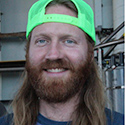
Assistant Professor
University of Alaska Fairbanks
Dr. Eric Collins is an Assistant Professor of Biological Oceanography at the University of Alaska Fairbanks' Institute of Marine Science. Depending on who is asking, he alternately describes himself as a 'biological oceanographer,' 'marine microbiologist,' 'microbial ecologist,' 'molecular ecologist,' 'bioinformatician,' or 'astrobiologist.' Eric is involved in several projects linking the diversity and distribution of microorganisms with their evolutionary histories as seen through the lens of genomics. With a particular interest in extreme environments, Eric has traveled north of the Arctic Circle in six different countries, including on a 550-kilometer ski traverse of the Greenland ice sheet in 2014. This is his first time on the Healy.
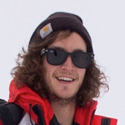
Graduate Student
School of Fisheries and Ocean Sciences, University of Alaska Fairbanks
Originally from Pennsylvania, Kyle received a B.S. in Marine Biology from the University of North Carolina Wilmington where he worked in the Benthic Ecology Lab studying intertidal oyster reefs. Now at the University of Alaska Fairbanks, Kyle is finishing his M.S. in marine biology where he studies the impact of under-ice oil spills to sea ice-associated flora and fauna for his thesis work. He has extensive experience sampling sea ice in the Arctic and will be part of the sea ice team during the cruise. Kyle is fascinated with the microscopic animals and algae that inhabit the interstices of sea ice and is looking forward to collecting them on this trip.
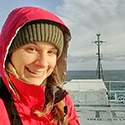
Graduate Student
University of Washington
Erica is a doctoral student in the School of Aquatic and Fishery Science at the University of Washington. She recently completed her M.S. on polar bear maternity den phenology and habitat characteristics. She is now working on a project under the direction of Drs. Kate Stafford and Kristin Laidre examining interannual variability in the presence of subarctic cetaceans (fin and humpback whales) in the Bering Strait using passive acoustic recordings. Her research interests revolve around studying how marine mammals are modifying their behavior in response to habitat shifts brought on by climate change. While on board the USCGC Healy, Erica will assist in counting and observing marine mammals from the bridge.

Graduate Student
University of Alaska Fairbanks
Angela was born and raised in Anchorage, Alaska, and received her B.S. in Marine Biology from the University of Alaska Southeast in Juneau in 2014. She moved to Fairbanks after graduating and has spent the last two years working in multiple labs at the University of Alaska Fairbanks, including the Wildlife Toxicology Lab, the Fish Genetics Lab, and most recently the Benthic Ecology Lab. She will begin pursuing a M.S. in Marine Biology at the University of Alaska Fairbanks in the Fall. Angela will be a part of the benthos team during this cruise and she is excited to see what interesting creatures they find!

Associate Professor
University of Alaska Fairbanks
Sarah Hardy is a benthic ecologist with a research focus on polar marine invertebrates. She earned her PhD in Oceanography from the University of Hawaii, and worked at the Natural History Museum in London, UK before coming to Alaska in 2007 for an International Polar Year post-doctoral fellowship. She has participated in 10 expeditions to the Arctic and Antarctic, working on a range of topics that include reproductive ecology, food web dynamics, and community ecology of soft-sediment benthic fauna. Dr. Hardy is part of the benthic team, but will staying on dry land for this expedition. She is supervising a group of graduate students that will be investigating the inhabitants of the seafloor sediments, and examining the food source and habitat of the sediment community.
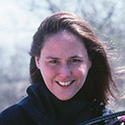
Media
Microcosm/Montrose Pictures
Michele Hoffman Trotter is an award-winning educator who fell in love with the ocean at age five and by 23, she was a fully hooked PADI instructor. Michele holds advanced degrees in marine biology (University of New South Wales) and law (DePaul University) and has worked with diverse audiences at Sydney Aquarium and the John G. Shedd Aquarium of Chicago. Currently, Michele is Director of Education and Advancement with the Hawaii Association for Marine Education and Research and serves as faculty at Columbia College, School of the Art Institute, and Roosevelt University, where she teaches a range of courses that span traditional ocean sciences to sustainability courses that encompass law, policy, and ethics. Michele's articles and photography have appeared in international publications and she has been recognized in several international photo competitions. On this expedition, Michele will join colleagues at the University of Alaska Fairbanks to film for a documentary she is co-directing about the microscopic universe in the ocean. She resides in Chicago with her husband Bob and young son Ryan (also avid ocean enthusiasts) who share in her research and travel adventures.

Professor
Institute of Marine Science, University of Alaska Fairbanks
Dr. Russ Hopcroft is a full Professor at the University of Alaska's Institute of Marine Science in Fairbanks. He grew up fascinated by aquatic life (and Jacques Cousteau specials), pursuing the sciences during his education. Dr. Hopcroft received his Masters degree in 1988 and his Ph.D. in 1997 from the University of Guelph, Ontario, Canada. The focus of his graduate research was on marine plankton ecology in the tropical waters surrounding Jamaica, West Indies. From 1997 to 1999, Dr, Hopcroft was a Post-doctoral Fellow at the Monterey Bay Aquarium Research Institute (MBARI). At MBARI, he was heavily involved in the use of ROVs, as well as traditional oceanographic surveys, to study the oceans. He joined the Univervisty of Alaska Fairbanks in 2000 and has since focused on Arctic and subarctic ecosystems.
Dr. Hopcroft pursues a broad array of research interests, concentrating on the "lower" planktonic trophic levels that ultimately shape the structure of all marine communities. His research focuses on the composition, production, and energy flow of pelagic ecosystems and better methods to explore these topics. With nearly 100 scientific publications, he is a leading expert on Arctic zooplankton biodiversity, with broad expertise across all zooplankton groups. Although much of his research focuses on the abundant copepod crustaceans, he is also a specialist on the taxonomy, biology, and ecology of the larvacean pelagic tunicates.
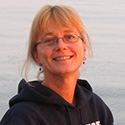
Professor
University of Alaska Fairbanks
Dr. Katrin Iken is a benthic ecologist with particular interest in the Arctic ecosystem. She studies biodiversity in benthic communities and food web connections using stable isotope analysis. She has been working in the Arctic for 15 years, with significant time spent in the field every summer. Katrin received her PhD at the Alfred Wegner Institute for Polar and Marine Research (AWI) in Germany and did post-doctoral work at the AWI and the University of Alabama at Birmingham, working mostly in the Antarctic, before starting a faculty position at the University of Alaska Fairbanks and discovering her love for the Arctic. Katrin is the lead investigator of this expedition’s seafloor (benthic) component, focusing especially on the so-called "epibenthos," which refers to the organisms that live on top of the seafloor sediments. She will work closely with the investigators that look at "infauna," meaning the organisms that live buried within the sediments, and those investigators working with fishes living close to the bottom.
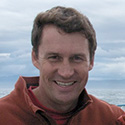
Director
Calypso Productions
Stuart is the founder and managing director of Calypso Productions based in Cairns Australia. Marine Biologist by trade, Stuart has developed his own unique form of filming and editing, which has gained him awards at Antibes, Celebrate the Sea, and other film festivals. Leading a team of underwater cameraman and women, his enthusiasm to capture imagery and share his knowledge has trained over 100 video/photographers in the marine tourism industry in the past 20 years. Providing filming services and stock footage to national and international television crews, Stuart is passionate about ensuring the marine world is represented in its true glory. Having dived extensively throughout the world, his philosophy is "the best dive is the next dive." Just as important though, are the people and places throughout the journey and differences we can make, by sharing our imagery.
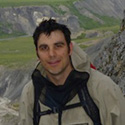
Research Scientist
University of Alaska Anchorage
Dr. Eric Klein is a geoscientist who incorporates both modern and paleo ecological and climatological techniques in studies of Earth system dynamics and hydroclimate patterns. He earned his M.S. from Alaska Pacific University in 2004 and his PhD from Lehigh University in 2013. His M.S. graduate work analyzed wetland drying and succession in Southcentral Alaska and his Ph.D. research showed the importance of hydrogeologic variability for the response of Alaskan peatland carbon accumulation to changes in climate. His recent work includes using water isotope geochemistry as a tool to help understand northern latitude hydroclimatic processes. He has also worked with Arctic Alaska mountain glacier ice core isotopes to reconstruct past hydroclimate changes associated with fluctuations in sea ice. Aboard the Healy he will collect water isotope samples from vapor, seawater, sea ice, and precipitation to help understand the relationship between water isotopes, Arctic sea ice, and climate. He will also collect carbon isotope samples to learn about changes in atmospheric and oceanic carbon exchange.
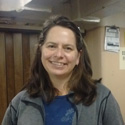
Seabird Biologist
U.S. Fish and Wildlife Service, Anchorage, Alaska
Elizabeth Labunski is a wildlife biologist and seabirds specialist for the U.S. Fish and Wildlife Service, Division of Migratory Bird Management, in Anchorage Alaska. Elizabeth has been studying birds in Alaska since 1999. Currently she is involved in several research projects investigating the distribution and abundance of seabirds in offshore environments in order to identify important marine habitats in the Arctic, Bering Sea, and Gulf of Alaska. On this expedition, Elizabeth will be conducting seabird surveys from the bridge of the USCGC Healy.
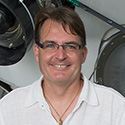
JAMSTEC
Dr. Dhugal Lindsay is an Australian working in Japan at JAMSTEC and several universities. His research focuses on mid-water ecology, particularly concentrating on gelatinous organisms that are too fragile to be sampled by conventional methods. He is also heavily involved in developing the technologies to study these organisms in situ. Dr. Lindsay has taken part in surveys in the Antarctic, the Sargasso Sea, the Challenger Deep, the Mediterranean, at hydrothermal vents, the Coral Sea, South-East Asia etc. collecting DNA barcodes, voucher specimens, and ecological information on species in order to characterize their realized and potential niches, revise their taxonomy, and provide an expert-vetted molecular toolkit for future studies on the life histories and feeding ecology of this extremely important fraction of the deep biosphere. He also likes writing haiku poetry and is looking forward to his first trip to the Arctic as another source of inspiration.
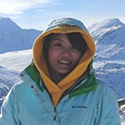
Ph.D. Student
University of Alaska Fairbanks
Kofan Lu received her M.S. in Computer Science from National Tsing Hua University in Taiwan. She worked as an animation engineer in Next Media Animation, using physical simulation to help animators efficiently publish animated news stories. Kofan was an ocean modeling researcher at IONTU (Institute of Oceanography, National Taiwan University) in Summer 2012, investigating the dynamics of turbidity river plume in estuary and coastal regions using ROMS model integrations. Kofan is currently a Ph.D. student at the University of Alaska Fairbanks, working with Dr. Tom Weingartner and Dr. Seth Danielson. Her research focuses on the frontal instability in the Chukchi Sea, the effects of oceanic heat flux on sea ice, and sea ice thermodynamics in ocean modeling.

Marine Biologist
Heidi received her Bachelor of Science in Marine Biology from Autonomous University of Baja California Sur. She is passionate about jellyfish and her thesis research focused on cannonball jellyfish at the Biological Research Center of the North West (CIBNOR). Heidi plans on pursuing a Master's degree in oceanography at the University of Alaska Fairbanks. She is interested in gelatinous zooplankton biodiversity in Arctic and Subarctic waters. Her hobbies include kayaking, stand-up paddle boarding, and SCUBA diving. This is Heidi's second research cruise and she loves Alaskan wildlife.
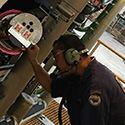
ROV Sr. Technician
Oceaneering
Toshi Mikagawa is a Japanese native who came to Deep Sea Systems International, a subsidiary of Oceaneering, with a Master's degree in geophysics and seven years of remotely operated vehicle (ROV "KAIKO") piloting under his belt in 2006. He has explored the farthest reaches of the sea, from the Bering Strait to the Mariana Trench, the deepest part of the ocean, in 1995. Whether it is finding the lost World War II submarine USS Grunion in Alaska or being part of the crew that first discovered the "black smoker" hydrothermal vents in the Indian Sea, Mikagawa is happiest when on the ocean "living" with the ROV. In 2014, he transferred to the main Oceaneering operation to master his ROV operational skills. He will be piloting the ROV during this expedition.
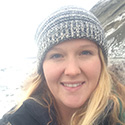
Graduate Student
University of Alaska Fairbanks
Jessica Pretty made the trek to Alaska in January of 2015 to pursue her Master of Science in Oceanography at University of Alaska Fairbanks. After receiving her Bachelor of Science in Biological Oceanography from Old Dominion University in Virginia, she moved to California to teach marine science and play in the ocean for a couple years until getting the pull to come North. Jessica will be running the Underwater Vision Profiler (UVP) instrument, an underwater camera system built to take images of particulate matter in the water column, during this research cruise. When not working on her thesis, Jessica enjoys hiking, running, cross-country skiing, and most any water-related activity that exists.
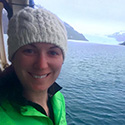
Post-doctoral Researcher
University of Connecticut
Jennifer Questel was born in Albany, New York, and graduated high school from Ogdensburg Free Academy in Ogdensburg, New York. She received her B.S. in zoology from the State University of New York at Oswego. Here, she gained her first research experience with zooplankton by sampling and tracking invasion pathways of a non-native mysid shrimp into the Great Lakes using genetic markers. Jennifer recently received her Ph.D in Oceanography from the University of Alaska Fairbanks under Russell Hopcroft. Her dissertation focused on zooplankton assemblages in the northeastern Chukchi Sea to better understand how physical, chemical, and genetic processes influence the patterns observed in planktonic organisms. Jennifer is currently a post-doctoral researcher at the University of Connecticut and is a member of the biological oceanography team for the Healy Chukchi Borderlands cruise. Her role during the cruise will consist of collecting zooplankton samples for metagenetic analysis and species barcoding in an effort to resolve Arctic zooplankton biodiversity. In addition to Jennifer’s enthusiasm for lower trophic organisms, she also enjoys photography, especially of the Aurora Borealis, and going on adventures with her Bernese Mountain Dog, Odin.
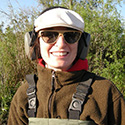
Expedition Coordinator
Bureau of Ocean Energy Management
When not sailing in the Arctic, Katherine 'Kate' Segarra is a biological oceanographer with the Department of Interior's Bureau of Ocean Energy Management (BOEM). As a staff scientist for BOEM's Environmental Studies Program, Kate coordinates environmental studies on the potential biological impacts of energy and marine mineral development on the outer continental shelf. Kate began her science policy career as a Knauss Fellow in the Office of the Oceanographer of the Navy. There she coordinated interagency efforts related to the National Ocean Policy and served as the Acting Climate Change Affairs Officer for Navy’s Task Force Climate Change. She has also served as a Program Coordination Officer for the Office of Oceanic and Atmospheric Research (OAR) in the Office of the Under Secretary. Serving as a liaison between NOAA's headquarters and OAR, she provided counsel and analysis of NOAA's ocean, climate, and weather research portfolios, climate policy, and research partnerships.
Kate holds a Ph.D. in Marine Sciences from the University of Georgia. Her dissertation in microbial biogeochemistry was focused on carbon cycling in coastal wetlands and deep-sea sediments. Her research brought her aboard her first NOAA Office of Ocean Exploration and Research cruise on the Expedition to the Deep Slope. She received a Bachelor of Science degree in Environmental Sciences from Brown University where she researched the carbonate cycle of the Narragansett Bay for her senior honors thesis. A Gulf Coast native, Kate misses living near the water and enjoys soccer, traveling, and city life.
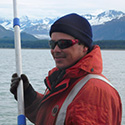
Mooring Technician
Seward Marine Center, University of Alaska Fairbanks
Pete Shipton grew up in New Jersey and went to school at Rutgers University. He graduated in 2009 with degrees in Geology and Environmental Geomatics. In 2012, he moved from New Jersey to Seward, Alaska. He started working for the University of Alaska Fairbanks as a mooring technician in 2013 and has designed and deployed moorings in Antarctica, the South Atlantic, and all over Alaska.
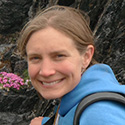
Graduate Student
University of Alaska Fairbanks
Leah Sloan is currently pursuing a Ph.D. in marine biology at the University of Alaska Fairbanks. She earned her M.S. in Biology from Humboldt State University and her B.S. in Biology from California State University, Long Beach. Leah has broad and varied research interests across aquatic and terrestrial systems, typically including questions in taxonomy, ecology, and conservation biology. For her Ph.D., she is currently pursuing interests in marine ecology, parasitology, larval biology, and fisheries sustainability. She studies multiple factors that influence the sustainability of the Alaskan king crab fisheries, primarily a king crab parasite that can castrate crabs and control their behavior. Leah has participated in research cruises in Southeast Alaska, but this is her first Arctic cruise. On the Healy, Leah will be collecting benthic sediment samples. When not doing research, she enjoys being outside, exploring the wonders of Alaska.
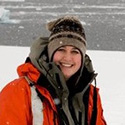
Research Professional
University of Alaska Fairbanks
Caitlin will be part of the zooplankton team on this expedition. She started her career in the biological sciences working with invertebrates in seagrass beds in the Chesapeake Bay while working on her undergraduate degree at the College of William and Mary. After earning her B.S. in Biology, she worked with micro- and meso-zooplankton, larval fish, and benthic invertebrates in the Great Lakes. Her interest in polar ecosystems was sparked when she worked as a zooplankton technician in the Antarctic. She completed a M.S. degree in Marine Biology at the University of Alaska Fairbanks where she studied epipelagic and mesopelagic zooplankton communities in the Beaufort Sea. After her degree completion, she transitioned to a research staff position at the University of Alaska Fairbanks where she continues to work with zooplankton in the Pacific-Arctic region. Her fieldwork experience ranges from small watercraft work on rivers and the Great Lakes to multi-week expeditions in the Antarctic, Arctic, and North Pacific.
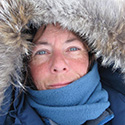
Oceanographer, Associate Professor
University of Washington
Dr. Kate Stafford is both a principal oceanographer in the Applied Physics Lab and an affiliate associate professor in the School of Oceanography at the University of Washington. Her research uses passive acoustic monitoring to study large whale species, primarily based in polar regions, with a particular focus on the Arctic. Much of her research looks at the geographic and seasonal occurrence of large whales based on sound production and the integration of acoustic data with environmental variables to develop predictive models of the occurrence of whales based on their environment. On the Healy cruise, she will be leading a visual survey for marine mammals from the bridge to document how species composition changes from the Gulf of Alaska through the Bering Sea and up into the high Arctic. She will also be retrieving and redeploying a hydrophone (underwater microphone) that has been deployed for the past year in the Northeast Chukchi Sea.
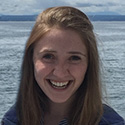
Graduate Student
University of Washington
Jenny Stern is currently pursuing her M.S. in Aquatic and Fishery Sciences at the University of Washington. She worked on multiple research projects throughout her undergraduate career at the University of Kansas, including the effect of climate change on tree phenology, population shifts in bees, and the evolution of venom in sharks. Her current research interests focus on the foraging behavior of polar bears as it relates to population dynamics. She has a strong interest in environmental outreach, with experience as a marine summer program intern at the New England Aquarium and a naturalist at her local nature center. On this expedition, she will function as a marine mammal observer on the Healy. Jenny's future career goals include becoming a polar biologist studying the effects of climate change on marine mammals.
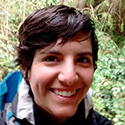
Graduate Student
School of Fisheries and Ocean Sciences, University of Alaska Fairbanks
Lauren Sutton is beginning her graduate career aboard the USCGC Healy under the advisement of Dr. Katrin Iken, studying functional diversity and ecology of benthic Arctic invertebrates. Born and raised in the Pacific Northwest, Lauren has a Bachelor of Arts in Bio-cultural Anthropology as well as a Bachelor of Science in Environmental Science with a Marine Ecology emphasis from Western Washington University. After spending three summers kayaking in Glacier Bay National Park, Lauren went back to college to obtain a degree where she could study marine organisms in Alaska's extreme climate. Lauren is hoping to contribute to ongoing Chukchi Sea research and is very excited to get this jumpstart on her Master's thesis.

Undergraduate Student
Kitasato University
Yui Takagi is an undergraduate student at Kitasato University in Japan and a member of the mid-water team on this expedition. She is researching how environmental factors affect the distribution of gelatinous zooplankton in the Japan Sea and Arctic Ocean. Yui will analyze the ROV video from the mid-water dives and record captured specimens using cameras on board. This is her first year studying gelatinous zooplankton as well as her first time overseas. She hopes to discuss and learn from everyone as much as she can.
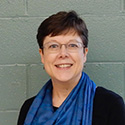
Teacher-At-Sea
Broadwater Academy
Sandra Thornton teaches biological and physical science courses at Broadwater Academy on the Eastern Shore of Virginia. A lifelong love of science, fostered by parents and teachers who encouraged her to explore the world around her, motivates Mrs. Thornton to instill this same love of learning in her students. She holds B.S. and M.S. degrees in Biology, and feels fortunate to have a career that allows her to combine a passion for science with working with teens. When not teaching, Mrs. Thornton is an avid reader who loves to travel and explore with her husband. As an educator working with the team, her role is to make the science behind the research accessible to students and the community.
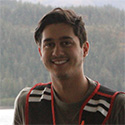
Graduate Student
School of Fisheries and Ocean Sciences, University of Alaska Fairbanks
Originally from California, Brian received a B.S. in Aquatic Biology from the University of California Santa Barbara. He is currently pursuing a M.S. in Biological Oceanography at the University of Alaska Fairbanks. Previously, Brian worked as a coral reef scientific diver in Moorea, French Polynesia. Off the clock, he's typically found polishing his bicycle. Shifting gears from tropical to polar ecology, his current research involves assessing extant diversity and distribution of pelagic marine microbial communities across gradients of Atlantic versus Pacific water mass influence within the Arctic Ocean. Aboard the Healy, Brian will be filtering seawater for the collection of DNA/RNA of single-celled organisms. These molecular samples will be sequenced to identify microbial members that contribute to the vast biodiversity within this seasonally ice-covered region of the Arctic Ocean.
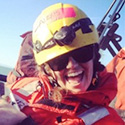
Graduate Student
College of Fisheries and Ocean Sciences, University of Alaska Fairbanks
Alexis Walker is a graduate student pursuing her Ph.D. in Marine Biology at the University of Alaska Fairbanks. She is currently working on characterizing bacterial and archaeal communities from Arctic marine sediments, particularly from the Beaufort Sea. Alexis will be working with the benthic team under Dr. Katrin Iken and will be sorting benthic invertebrates, reviewing ROV video survey footage, and assisting with various other tasks. This will be Alexis' fourth research cruise and second cruise in the Arctic. She is incredibly excited about this cruise in particular as two of her favorite worlds, the Arctic and deep sea, will be colliding in the spirit of exploration. The dynamic hydrology and unique bathymetry are just a couple of the aspects which make the Chukchi Borderlands an intriguing place to explore.
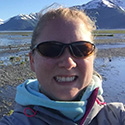
Graduate Student
University of Alaska Fairbanks
Kelly Walker is a fisheries graduate student at the University of Alaska Fairbanks. She has been working in the Norcross Fisheries Oceanography Lab since 2011 and decided to pursue her Master’s degree in 2014. For the last five years, she has participated in research cruises in the Chukchi and Beaufort Seas, gathering information on local fish life. Her main duty in the lab is to process and age fish otoliths for many different Arctic marine species. She plans on graduating with her degree in December 2016. During this cruise, she will be sampling for benthic invertebrates and fishes and is looking forward to what her net brings to the surface.
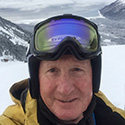
Professor
University of Alaska Anchorage
Dr. Jeff Welker is a Fulbright Distinguished U.S. Arctic Chair-Norway and a Professor in the Department of Biological Sciences at the University of Alaska Anchorage. He graduated from Texas A&M University with his Ph.D. and has been working in the Arctic since 1990, beginning his program in Svalbard, Norway. Dr. Welker has studied Arctic System climate change in Northern Alaska since 1994, addressing how both changes in winter and in summer conditions drive shifts in carbon, water and nitrogen cycling of tundra plants and ecosystems. He will be using his experience in isotope biogeochemistry aboard this expedition as a member of the University of Alaska Arctic Domain Awareness Center (ADAC), studying the spatial and temporal variation in water; the carbon isotope biogeochemistry of water vapor, carbon dioxide, and methane in the marine boundary layer; and sea water isotopes by using in situ, continuous Picarro laser-based isotope measurement devices. This will be the first time water vapor, CO2/CH4 and sea water isotope traits have been measured simultaneously over a complete transect from the Gulf of Alaska to the north end of the Chukchi Sea. These findings will help reveal how variation in Arctic sea ice controls ocean-atmosphere exchanges, productivity, and food web properties.

Associate Professor
Hokkaido University
Atsushi Yamaguchi graduated from Hokkaido University in 1993 with a degree in Marine Biology and then obtained a Ph.D. (Fisheries Sciences) from Hokkaido University in 1999. Dr. Yamaguchi is currently studying copepod ecology, particularly deep-sea species. During the Healy cruise, he will collect samples for carbon and nitrogen stable isotope (SI) ratios (δ13C and δ15N) of zooplankton. By analyzing the SI of the zooplankton, he will be able to evaluate the Arctic Ocean’s food web structure.

Graduate Student
UiT – The Arctic University of Norway
Irina Zhulay completed her Bachelor's degree in Ecology Science, majoring in nature conservation issues, from Petrozavodsk State University, Russia. During undergraduate school, she was a member of the Ecology and Northern Wildlife Exchange Program at Bodo University College (now Nord University, Bodo, Norway), which comprised a field trip to Svalbard, where she first discovered the fascinating field of Arctic studies. Irina then earned her Master's degree from Nord University, where she studied benthos ecology. Afterward, she spent a year in Saint Petersburg, working on a project called the "Response of the zooplankton community to climate change in the Arctic region (Siberia, Russia)." Currently, Irina is a Ph.D. student at The Arctic University of Norway (UiT, Tromso). Her supervisors are Professor Bodil Bluhm (Department of Arctic and Marine Biology, UiT – The Arctic University of Norway) and Senior Researcher Paul Renaud (Akvaplan-niva and Professor II at the University Centre in Svalbard). Irina's PhD project focuses on the description of deep-sea faunal characteristics in the Arctic. On the Healy, she will be part of the benthic team that aims to study the seafloor communities of the Arctic deep sea. Using trawls and box corers, as well as the ROV, she hopes to collect data on benthic communities and their environment to improve current knowledge of the deep-sea fauna distribution and characterize deep-sea communities in terms of food web structure and functional trait composition. Irina is very excited to participate in her first icebreaker cruise with a team of experienced scientists.